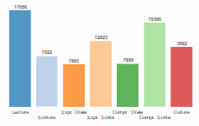| Grammar |
VTE + MO II (もいい)
The structure “Verb (form -TE) + MO II (もいい)” is used to express authorization (you can…, can I / may I...?), or to indicate that it’s not necessary to do an action (you don’t need to…). This structure is widely used in everyday life.
Let’s analyze some sentences in a literal manner.
| Anata wa kaette mo ii desu yo. |
| You can go back home. |
Literally: As far as you are concerned, going back home is fine.
| Nete mo ii? |
| Can I go to bed? |
Here, we are dealing with the request for permission. Literally: Even if I go to bed, is it good?
| Kono shigoto o hikiukete mo ii desu yo. |
| I can take care of this work. |
Literally: Doing this work, it’s OK / it’s alright for me.
| Ashita wa gakkou ni ikanakute mo ii yo. |
| You do not have to go to school tomorrow. |
Literally: Tomorrow, even if you don’t go to school, it’s fine.
| Shinpai shinakute mo ii desu yo. |
| You don’t need to worry. |
Literally: Even if you are not nervous, it’s fine.
It would be intriguing to talk about permission here, so this translation seems more logical.
Other forms exist that express the same thing with a softer tone:
“もよろしいです”: YOROSHII, which is the polite form of いい.
“もかまいません”: KAMAIMASEN, which is the polite form of かまわない: means that there isn’t a problem, that it doesn’t matter
| Shashin o totte mo yoroshii desu ka. |
| May I take a photo? |
| Watashi mo itte mo kamaimasen ka. |
| Do you mind if I come too? |
It’s also possible, in spoken and informal language, not to use the particle MO, and thus to simply put いい after the -TE formation of the verb.
| Tabete ii? |
| Can I eat? |
| Can't be translated as “May I eat” |
More information
To express the past form of this structure, simply replace the adjective いい by its past form YOKATTA (よかった).
It’s also possible to find YOI (よい) instead of いい. It’s the same structure but a little more formal.
| Aucun commentaire |



















